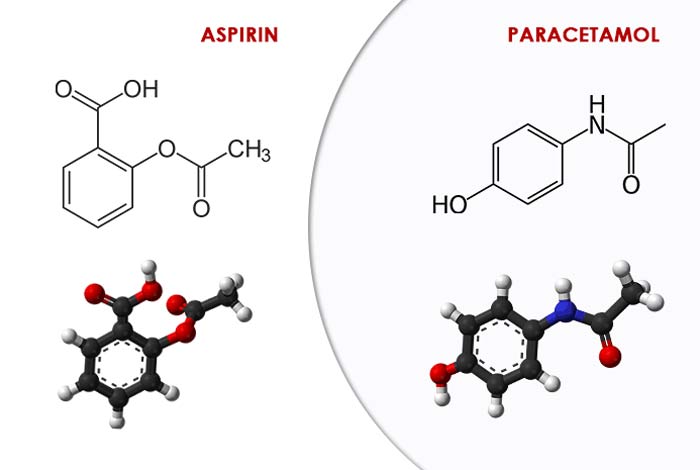
Excedrin – Information, Uses, Side Effects and Dosage

Drug Trade Name: Excedrin
Category: Non-steroidal Anti-inflammatory Drug (NSAID), Central Nervous System Stimulant
Generic Name: acetaminophen, aspirin, and caffeine
Introduction and Quick Information:
Acetaminophen and Aspirin belong to a drug class, known as Non-steroidal anti-inflammatory drugs (NSAIDs). This group of drug inhibits the synthesis of a chemical, called Prostaglandins. Prostaglandins induce pain and inflammation. This chemical is produced by an enzyme, known as cyclooxygenase (COX) enzyme. By blocking COX enzyme, acetaminophen and aspirin prevent the synthesis and release of prostaglandins, thus relieving pain and inflammation. However, it must be noted that acetaminophen has a marked analgesic (pain-relieving) and antipyretic (reducing body temperature in a fever) action, but it has a weak anti-inflammatory action.
Caffeine is one of the effective central nervous system stimulants. It reduces inflammation and relieves pain.
An addition of caffeine in acetaminophen and aspirin makes the drug works faster and also increases the efficiency of the drug.
Is Excedrin Approved by FDA?
Yes, U.S. FDA has approved Excedrin to treat fever, pain, and inflammation.
Usage and Benefits of Excedrin:
Excedrin is used to treat mild to moderate pain associated with a tension headache, backaches, migraine headache, menstrual cramps, nasal congestion, toothache, arthritis, common cold and muscle aches.
Excedrin Side Effects:
Some of the possible side effects of Excedrin are:
- fainting or weakness
- black, tarry, or bloody stools;
- coughing up blood
- vomit which appears like coffee grounds
- severe nausea
- excess vomiting
- uncontrollable stomach pain
- swelling or redness
- low fever with nausea
- loss of appetite
- dark urine
- clay-colored stools
- jaundice (yellowing of eyes or skin)
- fever lasting more than three days
- pain lasting longer than ten days
- hearing problems, ringing in your ears
- upset stomach
- heartburn
- feeling excited or nervous
- sleep problems (insomnia)
If you find any of the any of the mentioned side effects or anything unusual, inform your medical practitioner immediately.
General Recommended Dosages of Excedrin:
You need to use this drug in the dose recommended by your healthcare provider. An overdose can cause deleterious effects such as liver damage.
In case you drink more than three alcoholic beverages in a day, consult your physician prior to consuming acetaminophen.
You need to take Excedrin with one complete glass of water. Take it with milk or food in case it makes your stomach upset.
If the symptoms are not relieved by Excedrin, consult your physician.
Inform your surgeon about the use of Excedrin prior to undergoing surgery.
In Case I Miss the Dose?
Take the missed dose as soon as you remember. However, if it is about time to take the next scheduled dose, you need not take the missed dose and can proceed with the scheduled dose.
In Case I Take Overdose?
Excedrin overdose symptoms include dark urine, pain in upper stomach, weakness or confusion, stomach pain, sweating, and vomiting.
In case of experiencing such symptoms, seek emergency medical help immediately.
Drug Interactions of Excedrin:
Some of the commonly used drugs, which can cause complications when taken with Excedrin are as follows.
- warfarin (Coumadin)
- alteplase (Activase), dipyridamole (Persantine), clopidogrel (Plavix), urokinase (Abbokinase) and ticlopidine (Ticlid)
- antidepressants like citalopram (Celexa), fluoxetine (Sarafem, Prozac, Symbyax), paroxetine (Paxil), fluvoxamine (Luvox), escitalopram (Lexapro), etc.
There are many more drugs which can interact with Excedrin. Hence, give a detailed drug history to your doctor before consuming Excedrin.
Lifestyle and Food Habits You Must Follow When on Excedrin:
Acetaminophen consumption can negatively impact your liver and aspirin is a major gastric irritant. Thus, consumption of alcohol can worsen these side-effects. Hence, alcohol intake is not recommended when on Excedrin. Smoking cigarettes and nicotine consumption are also condemned. Adequate hydration and a healthy diet can augment the efficacy of the drug.
How Safe Is Excedrin for Pregnant Women or Nursing Mothers?
Aspirin can affect the cardiovascular health of the baby if these are consumed during pregnancy, especially in the third trimester. Acetaminophen is considered safe during pregnancy if consumed intermittently and for a short duration fo time. The effect of caffeine in the developing fetus is not known.
Aspirin, acetaminophen, and caffeine are excreted in human milk. Aspirin can cause rashes, bleeding and platelet anomalies in the nursing infant. Adverse effects of acetaminophen on a nursing infant are unlikely. Caffeine intake by lactating mother in recommended dose is considered safe for a nursing infant.
Hence, discuss with your doctor if you are pregnant or lactating.
Complications and Conditions Possible Due to Prolonged Use of Excedrin:
It is not known if Excedrin poses an addiction liability or not. Hence, sudden stoppage of the drug is not recommended. Talk to your doctor before stopping the therapy.
Availability of Excedrin:
Because of the mild side-effects associated with the drug, Excedrin is readily available over-the-counter. However, a prior consultation with a doctor is necessary.




